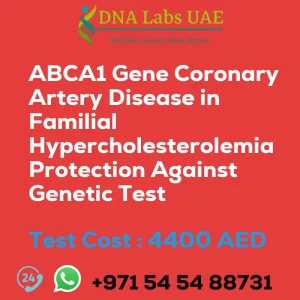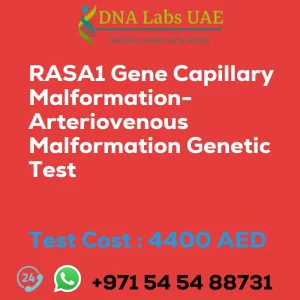ABCC6 Gene Arterial Calcification Type 2 Generalized Infantile Genetic Test
At DNA Labs UAE, we offer the ABCC6 Gene Arterial Calcification Type 2 Generalized Infantile Genetic Test at a cost of 4400.0 AED.
Test Details
The ABCC6 gene is responsible for producing a protein called the ATP-binding cassette sub-family C member 6. Mutations in this gene can lead to a condition known as arterial calcification type 2, generalized, infantile. This rare genetic disorder is characterized by abnormal calcification (hardening) of the arteries throughout the body.
Arterial calcification type 2, generalized, infantile can result in various complications such as narrowing of the blood vessels, reduced blood flow, and increased risk of heart attacks and strokes.
NGS Technology
We use NGS (Next-Generation Sequencing) technology for this genetic test. NGS genetic testing allows for the simultaneous analysis of multiple genes or the entire genome.
Test Process
To perform the ABCC6 Gene Arterial Calcification Type 2 Generalized Infantile Genetic Test, we require a DNA sample. This sample can be obtained through a blood sample or cheek swab.
The DNA sample is then sequenced using advanced technology to identify any abnormalities or mutations in the ABCC6 gene.
Report Delivery and Test Department
The report for this genetic test will be delivered within 3 to 4 weeks. The test is conducted in our Genetics department.
Pre Test Information
Before undergoing the ABCC6 Gene Arterial Calcification Type 2 Generalized Infantile Genetic Test, it is important to provide the clinical history of the patient. Additionally, a genetic counseling session will be conducted to draw a pedigree chart of family members affected by ABCC6 Gene Arterial Calcification Type 2 Generalized Infantile.
Test Type and Doctor
This test falls under the category of Vascular Diseases. It is recommended to consult with a General Physician for this test.
Conclusion
The ABCC6 Gene Arterial Calcification Type 2 Generalized Infantile Genetic Test is a valuable tool for diagnosing individuals suspected of having this condition. It can guide medical management, provide prognosis information, and assist in genetic counseling for affected individuals and their families.
| Test Name | ABCC6 Gene Arterial calcification type 2 generalized infantile Genetic Test |
|---|---|
| Components | |
| Price | 4400.0 AED |
| Sample Condition | Blood |
| Report Delivery | 3 to 4 Weeks |
| Method | NGS Technology |
| Test type | Vascular Diseases |
| Doctor | General Physician |
| Test Department: | Genetics |
| Pre Test Information | Clinical History of Patient who is going for ABCC6 Gene Arterial calcification type 2, generalized, infantile NGS Genetic DNA Test. A Genetic Counselling session to draw a pedigree chart of family members affected with ABCC6 Gene Arterial calcification type 2, generalized, infantile NGS Genetic DNA Test gene ABCC6 |
| Test Details |
The ABCC6 gene is responsible for producing a protein called the ATP-binding cassette sub-family C member 6. Mutations in this gene can lead to a condition known as arterial calcification type 2, generalized, infantile. Arterial calcification type 2, generalized, infantile is a rare genetic disorder characterized by abnormal calcification (hardening) of the arteries throughout the body. This can lead to various complications such as narrowing of the blood vessels, reduced blood flow, and increased risk of heart attacks and strokes. NGS (Next-Generation Sequencing) genetic testing is a type of genetic testing that allows for the simultaneous analysis of multiple genes or the entire genome. In the context of arterial calcification type 2, generalized, infantile, NGS genetic testing can be used to identify mutations in the ABCC6 gene, providing a definitive diagnosis for individuals suspected of having this condition. The NGS genetic test involves obtaining a DNA sample, typically through a blood sample or cheek swab. The DNA is then sequenced using advanced technology to identify any abnormalities or mutations in the ABCC6 gene. The results of the test can help guide medical management, provide information about prognosis, and assist in genetic counseling for affected individuals and their families. |







